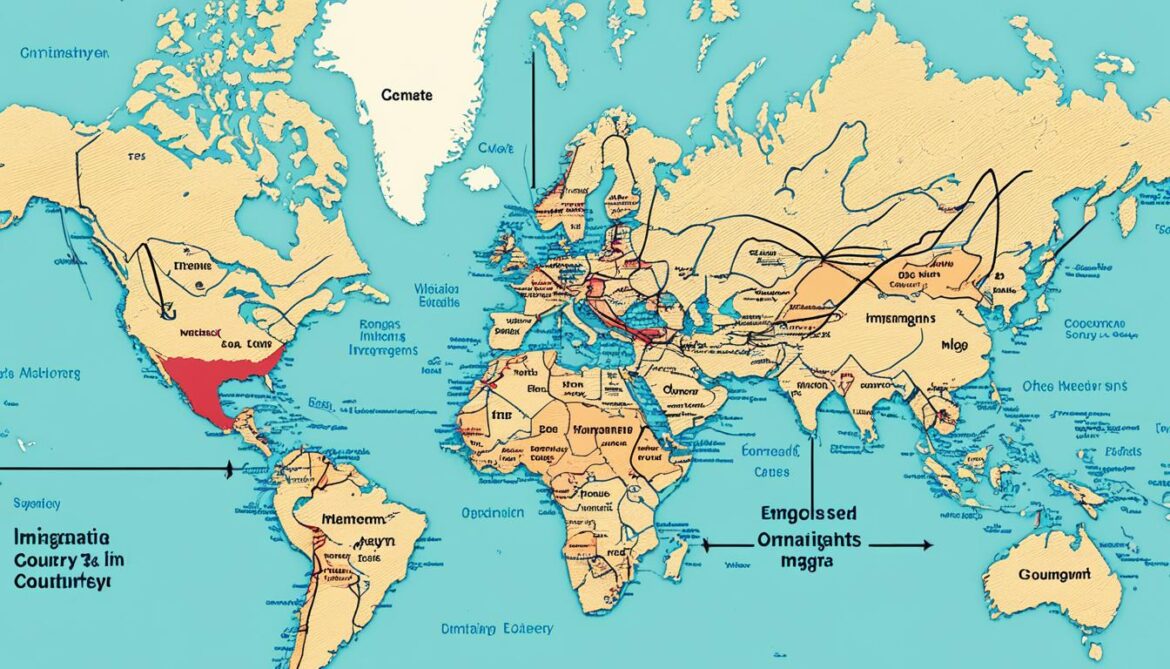When it comes to moving across borders, many people use the terms ‘immigrate’ and ’emigrate’ interchangeably. However, there’s a subtle yet significant difference between the two. Understanding the difference between immigrate and emigrate is crucial for proper usage in both speech and writing, especially when discussing international movement and relocation. This article aims to elucidate these distinctions, providing readers with clear insights into when and how to use each word appropriately.
Key Takeaways
- Immigrate and emigrate are two terms with distinct meanings tied to the direction and perspective of movement.
- The difference between immigrate and emigrate is central to discussions about international relocation and citizenship matters.
- Correctly using immigrate and emigrate reflects a person’s understanding of legal and geographical nuances.
- Awareness of the contextual application of immigrate vs emigrate enhances clarity in communication.
- Personal experiences of individuals often highlight the practical distinction between immigrating to a new country and emigrating from one’s homeland.
Understanding the Definitions: Immigrate and Emigrate
In an ever-globalizing world, the concepts of migration are frequently discussed, often leading to confusion between the terms ‘immigrate’ and ’emigrate.’ By understanding the immigrate definition and emigrate meaning, along with the origins and usage of immigrate and emigrate, these seemingly similar terms reveal distinct nuances. Below, we dissect each term to elucidate its particular implication in the context of international movement.
Immigrate Definition: Settling into a New Country
The term ‘immigrate’ focuses on the arrival aspect of migration. It is defined as the action of moving to a new country with the intention of establishing residence, particularly on a permanent basis. When someone immigrates, they are typically seeking opportunities, safety, or perhaps reuniting with family in a country that is not their place of origin.
Emigrate Meaning: Leaving Your Home Country
Contrastingly, ’emigrate’ captures the departure perspective. It signifies the act of leaving one’s own country to live in another. Thus, when individuals emigrate, they are exiting their native country’s boundaries, often to pursue the same opportunities or aspirations that motivate immigration.
Origins and Usage in Sentence Structure
The origins of ‘immigrate’ and ’emigrate’ can be traced back to Latin, with ‘immigrate’ deriving from ‘immigrare’ meaning ‘to move into,’ and ’emigrate’ from ’emigrare’ implying ‘to move away from.’ Their usage in sentence structure hinges on these roots; ‘immigrate’ is typically followed by ‘to,’ signifying the destination, while ’emigrate’ is complemented by ‘from,’ indicating the original location.
| Term | Definition | Origin | Preposition Use | Examples |
|---|---|---|---|---|
| Immigrate | Settle into a new country | Latin ‘immigrare’ | to | She plans to immigrate to Canada for better educational prospects. |
| Emigrate | Leave your home country | Latin ’emigrare’ | from | Many scientists emigrated from Europe during the 20th century. |
Grasping the immigrate definition and emigrate meaning enriches our understanding of human movement and the multifaceted nature of migration itself. As they reflect different sides of the same journey, their unique applications provide clarity in discussions that require specificity concerning the directional flow of migration.
Historical Context and Evolution of the Terms
Exploring the historical context of immigrate and emigrate reveals a rich tapestry of human movement and the shifting nuances of language. The evolution of the terms is closely tied to the migratory patterns that have shaped civilizations, cultures, and societies throughout history. As people moved from one region to another, either by choice or necessity, they carried with them the labels that identified their journey’s nature—whether they were arriving or departing, assimilating or exiling.
Initially, both terms were used somewhat interchangeably, but with the progression of international law and the complexity of global migration, the need for distinct definitions became evident. This sharpening of language was further influenced by social science researchers who sought to accurately describe and analyze migration flows, as well as by policymakers who needed precise terms to craft effective immigration and emigration rules.
Let’s look at a comparative illustration to better understand how these terms have diverged over time and context.
| Time Period | Term Usage | Socio-Political Influence | Impact on Language |
|---|---|---|---|
| 19th Century | Emergence of distinct usages during large scale trans-Atlantic migration | Industrial Revolution and colonial expansion | The terms began to take on specific legal and cultural interpretations |
| Early 20th Century | Increased precision in legal and administrative contexts | World Wars and the formation of nation-states | Legal distinctions become more pronounced, impacting international law |
| Late 20th Century to Present | Terms widely utilized with clear differentiation in global discourse | Rise of globalization and transnationalism | Evolving to meet the demands of nuanced discussions on human migration |
It is evident from the above that the historical context of immigrate and emigrate is essential to understanding the current applications and interpretations of these terms. Such insight allows us to see the evolution of the terms not just as linguistic shifts, but as reflections of our collective human experience—mirrored against the backdrop of our histories and the ever-changing patterns of our movements.
As the dynamics of immigration and emigration continue to transform in response to global crises, economic changes, and technological advancements, the terms will inevitably adapt further. The next evolution will likely be recorded by linguists and historians alike, as they observe how the language keeps pace with the stories of those who cross borders, seeking new horizons or departing old ones behind.
Immigrate vs Emigrate Contrast: A Deeper Dive
When we delve into the nuances of migration terminology, the directional perspective of immigrate and emigrate comes to the forefront. These two terms may seem interchangeable, but they offer distinct pathways of understanding an individual’s journey and transformation from one citizenship to another. Within this deeper dive into the contrast between immigrating and emigrating, we assess not just the journeys but also the resultant changes in legal status and citizenship that can define an individual’s identity and societal standing.
The Directional Perspective of Immigrate and Emigrate
To immigrate is to arrive, to emigrate is to depart—this simple directional perspective captures the essential movements in the concepts of immigration and emigration. A closer look at these terms reveals the push and pull factors that compel individuals to leave their home country (emigrate) and take up residence in a new one (immigrate). The decision to cross borders isn’t just a physical journey; it embodies a pursuit of aspirations, safety, or a life markedly different from the one left behind.
Implications on Legal Status and Citizenship
The implications on legal status and citizenship are profound, with the process of emigrating signifying the relinquishing of certain rights and responsibilities in one’s homeland, whereas immigrating can inaugurate the quest for a new set of civil and social entitlements. This duality extends to include differences in access to employment, social services, and voting rights—underscoring how a change in legal status can alter one’s participation and privileges within a society.
| Action | Legal Implications | Citizenship Status |
|---|---|---|
| Emigrate | May need to maintain certain obligations to homeland (e.g., taxes) | Possesses citizenship in homeland; potential dual citizenship |
| Immigrate | Must adhere to new country’s immigration laws for residence | Seeking citizenship or permanent residency in new country |
The consequential shifts in societal identity and participation underpin the importance of understanding the directional perspective of immigrate and emigrate, as well as the subsequent implications on legal status and citizenship. By examining these elements, one gains a deeper appreciation for the complex mosaic of migration and the transformative experiences of those who undertake such journeys.
Grammatical Guidelines for Using Immigrate and Emigrate
Understanding how to use the terms immigrate and emigrate correctly in a grammatical sense is crucial for clear communication. The distinction between each word not only carries geographic connotations but also specific grammatical considerations that must be taken into account to assure precision in writing and speech. Below are the key grammatical guidelines for immigrate and emigrate, addressing common questions and providing clarification on correct usage.
- Choice of Prepositions:
- Use immigrate with ‘to’ when referring to the destination (e.g., They immigrated to Canada last year).
- Use emigrate with ‘from’ to indicate the point of departure (e.g., They emigrated from Vietnam during the 1990s).
- Using Tenses:
- Immigrate and emigrate can be used in various tenses depending on the context (e.g., They are emigrating next month, She immigrated two decades ago).
- Subject and Verb Agreement:
- Ensure the subject and verb forms of immigrate and emigrate agree in number and person (e.g., He emigrates, They immigrate).
- Sentence Structure:
- When constructing sentences, consider whether the focus is on the departure or arrival. This will determine the choice between emigrate and immigrate (e.g., Focused on departure: Many people emigrated due to unfavorable conditions. Vs. Focused on arrival: Many immigrants have found new opportunities in their adopted countries).
By adhering to these grammatical rules when using immigrate and emigrate, you reinforce the accuracy and clarity of your message. Both terms fulfill a unique linguistic function, encapsulating the directionality of human movement, and must therefore be used with attention to detail to maintain their distinctive meanings.
For a practical demonstration of using these terms correctly, let’s consider their incorporation in a journalistic context. Reporters or writers covering immigration topics will need to employ these terms precisely to correctly capture the essence of the stories they tell.
| Incorrect Usage | Corrected Sentence |
|---|---|
| She emigrated to Spain last year. | She immigrated to Spain last year. |
| They are immigrating from Japan next month. | They are emigrating from Japan next month. |
Remember, thorough understanding and application of grammatical guidelines for immigrate and emigrate contributes significantly to meaningful and contextually aligned discourse.
Immigrate and Emigrate Usage in Official Documents
The intricacies of how countries manage movement across their borders are often reflected in the language used within their official documents. The terminology surrounding immigration and emigration holds particular weight, as it not only serves to inform the individual of their current status but also signifies the legal implications and requirements established by a nation’s policy.
Immigration Policies and Its Impact on Language
Immigration policies not only shape societal demography but also impact the linguistic constructs in official documents. As a government tightens or loosens its immigration policies, the terminology used in forms, guidance literature, and legal texts adapts accordingly. Key terms such as ‘immigrate’ and ’emigrate’ assume different levels of emphasis and clarity based on the intended use and context within these documents. This linguistic nuance must address both the bureaucratic precision required in legal matters and the inclusive communication needed for diverse applicant comprehension.
Examples from Passports and Visa Applications
Passports and visa applications are prime examples of how the terms ‘immigrate’ and ’emigrate’ manifest in official documents. These forms often require individuals to specify their immigration status with options like a permanent resident, visa holder, or citizen. Additionally, visas distinctively categorize the purpose of movement, illustrating whether an individual is aiming to immigrate permanently or emigrate for short-term or conditional stays.
Such distinctions hold substantial weight for those looking to navigate the complexities of international travel and residency. By understanding how immigration policies frame these pivotal decisions, individuals can better prepare their applications to align with the specific language requirements expected by immigration authorities.
- Visitor Visa: Specifies intent to emigrate for a temporary period.
- Permanent Residency: Designates the holder as an immigrant with the intention to establish a long-standing presence in the country.
- Work Permit: Indicates a more transient nature, residing between the realms of emigrating temporarily and immigrating for employment purposes.
Through the dissection of the application processes and document requirements, one can see a clear imprint of immigration policies. Language serves as a bridge between policy and practice, molding the experiences of those transitioning across the numerous gates of international borders.
Pronunciation and Common Misconceptions
The pronunciation of immigrate and emigrate, along with the common misconceptions about immigrate and emigrate, stir quite the conversation in language circles. Dissecting these elements is crucial in understanding not only the speech patterns but also the sociocultural narratives tied to migration. Let’s delve into proper pronunciation and unfurl the myths surrounding these terms.

Starting with pronunciation, ‘immigrate’ is phonetically sounded out as /ˈiməˌɡrāt/, with emphasis on the first syllable and a hard ‘g’. Conversely, ’emigrate’ is articulated as /ˈeməˌɡrāt/ or /ˈɛmɪɡreɪt/, also stressing the initial syllable followed by a soft ‘g’. Minor as they may seem, these audible distinctions can greatly affect comprehension, especially in academic or formal contexts.
- Correct: The phonetic spelling of ‘immigrate’ makes it clear the stress falls on the first part of the word.
- Incorrect: Pronouncing ‘immigrate’ with the emphasis misplaced can confuse listeners and is a common mistake to avoid.
Discussing the common misconceptions about immigrate and emigrate, there’s often a tendency to simplify these terms to ‘coming’ and ‘going’ without context. This oversimplification neglects the legal and emotional complexities involved in the migration process.
While ‘to immigrate’ includes the legal permanency notion, ‘to emigrate’ encapsulates a broader spectrum of movement, making them not mere opposites but rather complementary to the migration narrative.
Addressing these misconceptions is not only about promoting linguistic accuracy; it is also about fostering a more nuanced conversation on migration itself, offering valuable insight into the experiences of those who undertake these life-altering journeys.
Immigrate and Emigrate Examples from Public Figures
The stories of public figures who have navigated the journey between countries serve as powerful illustrations of the concepts of immigration and emigration. Their diverse backgrounds and reasons for moving often mirror the experiences of many, providing resonating case studies that reveal the nuances of these two actions.
Case Studies of Celebrities and Politicians
Examples of immigrate and emigrate in public figures include a litany of well-known names who have moved for career, personal, and political reasons. The following table sheds light on such cases, showcasing the directional nature of their global movements.
| Public Figure | Country of Origin | Country of Destination | Direction (Immigrate/Emigrate) | Reason for Movement |
|---|---|---|---|---|
| Elon Musk | South Africa | United States | Emigrate/Immigrate | Career opportunities in technology and entrepreneurship |
| Arnold Schwarzenegger | Austria | United States | Emigrate/Immigrate | Acting career and later political aspirations |
| Nicole Kidman | Australia | United States | Emigrate/Immigrate | Acting opportunities in Hollywood |
| Justin Trudeau | Canada | Canada | None (Internal Migration) | Political career within home country |
Incorporating Personal Stories to Illustrate Differences
Personal stories of celebrities and politicians who’ve made these international moves become a way to humanize the immigration and emigration process, prompting a deeper connection with the subject. For example, Arnold Schwarzenegger’s emigration from Austria and subsequent immigration to the United States can depict a tale of personal growth and the pursuit of the ‘American Dream.’ On the other hand, Justin Trudeau’s political journey within Canada illustrates that significant life progressions do not necessarily involve crossing international borders.
Incorporating personal narratives not only highlights the functional differences between immigration and emigration but serves as a testament to the multifaceted reasons behind why individuals choose to leave their country of origin or settle in a new one. These narratives can sometimes eclipse the typical case studies of celebrities and politicians, resonating with our shared human experiences of change, challenge, and new beginnings.
Immigrate or Emigrate Which is Correct? Contextual Clarity
Understanding when to use the terms immigrate and emigrate can be nuanced, hinging on the context and perspective of the subject involved. Achieving clarity in usage is critical, not only because it aids clear communication but also because these terms encapsulate important stages of human migration and the experiences tied to them. Here, we navigate through the scenarios where the correct usage of immigrate and emigrate is paramount, and we lay out guidance for correcting errors that are commonly encountered in speech and writing.
Scenarios Where One Term is More Appropriate Than the Other
There are distinct scenarios that call for either immigrate or emigrate, depending on the direction of the move. Immigrating is about the point of arrival – the act is tied to the person’s entrance into a new location. On the other hand, emigrating casts light on the departure, focusing on what a person leaves behind.
- Emigrate is most appropriate when discussing the act of leaving one’s country. For example, in discussing policies that led to individuals fleeing their homeland due to conflict or persecution.
- Immigrate is fitting when the focal point is on the individual’s settlement in the new country. Use this term while discussing the integration of individuals into a new society or their contributions to the local community they have joined.
Correcting Common Errors in Speech and Writing
It’s not uncommon to find people using ’emigrate’ and ‘immigrate’ interchangeably or inaccurately in both speech and writing. It is critical to note the importance of correcting these errors, as they may lead to misinformation or confusion regarding a person’s migratory status. Awareness and understanding of the proper contexts for each term can significantly improve preciseness in communication.
| Incorrect Usage | Corrected Sentence | Explanation |
|---|---|---|
| She emigrated to France last year. | She immigrated to France last year. | The focus is on the arrival in France, hence ‘immigrated’ is appropriate. |
| Many people have immigrated from the war-torn region. | Many people have emigrated from the war-torn region. | The sentence is highlighting the act of leaving, which is best expressed by ’emigrated’. |
| He’s planning to immigrate from Canada to start a new job. | He’s planning to emigrate from Canada to start a new job. | The action described is leaving Canada; therefore, ’emigrate’ is the correct term. |
Careful application of these terms can convey the lived experiences of individuals with much better accuracy, making it essential for anyone discussing migration to exercise proper usage. Familiarizing oneself with the correct contexts in which to use immigrate and emigrate is a step towards more effective and respectful communication regarding the experiences of those who undertake the significant life journey of moving from one nation to another.
Teaching Tools and Resources to Grasp Immigrate vs Emigrate
Understanding the subtleties of language not only enriches one’s vocabulary but also sharpens communication skills. For those keen on differentiating and properly using the terms immigrate and emigrate, a host of teaching tools and resources stand ready to assist. Interactive educational websites are a prime place to start, providing animated lessons that contextualize the terms in scenarios that simulate real-life situations of people moving across borders. These platforms often use engaging storytelling techniques to create memorable learning experiences, cementing the distinct uses of each term in the student’s mind.
For a more traditional approach, worksheets remain an excellent resource for understanding immigrate and emigrate. They allow learners to practice writing sentences that accurately reflect the migration directionality implicit in these terms. Many educational publishers and language-focused organizations offer downloadable materials that present exercises ranging from fill-in-the-blank activities to more elaborate composition prompts, designed to clarify when one term is more appropriate than the other.
The availability of online courses offers structured, comprehensive instruction from language experts. These programs, which are often self-paced, provide video lectures, quizzes, and discussion forums that deepen the learner’s grasp of the topic. Real-world examples from international news and global migration patterns can bring the lesson home, showcasing how these two terms navigate the complexities of law, society, and identity. Whether supplemental to formal education or as part of a self-taught regimen, these courses serve as robust resources for understanding immigrate and emigrate, ensuring that users can confidently navigate the intricacies of these commonly misunderstood words.
FAQ
What is the difference between immigrate and emigrate?
The key difference between immigrate and emigrate is the perspective. Immigrate refers to the act of settling into a new country, while emigrate means leaving one’s home country.
What is the definition of immigrate?
Immigrate means to move to a new country with the intention of settling there.
What does emigrate mean?
Emigrate means to leave one’s home country and move to another country.
What are the origins and usage of immigrate and emigrate in sentence structure?
These terms have historical origins and are commonly used to describe the act of moving to or leaving a country. Immigrate is used when focusing on moving into a new country, while emigrate emphasizes leaving a country.
What is the historical context and evolution of the terms immigrate and emigrate?
The terms immigrate and emigrate have developed over time and are influenced by various factors, including historical events and changing immigration policies.
How do immigrate and emigrate contrast in greater detail?
Immigrate and emigrate have different directional perspectives. Immigrate focuses on moving into a new country, while emigrate emphasizes leaving a country. These terms also have implications for legal status and citizenship.
Are there grammatical guidelines for using immigrate and emigrate correctly?
Yes, there are. Using the correct tenses, prepositions, and other grammatical considerations is essential when using these terms in sentences.
How are immigrate and emigrate used in official documents?
Immigration policies can influence the language used in official documents such as passports and visa applications. Examples of how these terms are used in official documentation can provide clarity.
How do you pronounce immigrate and emigrate? Are there any common misconceptions?
Both words are pronounced as “ih-muh-greyt” and “em-uh-greyt” respectively. Common misconceptions include using incorrect pronunciation or using the terms interchangeably.
Can you provide examples of public figures who have immigrated or emigrated?
There are numerous case studies of celebrities and politicians who have either immigrated or emigrated, which illustrate real-life examples of these terms in action. Personal stories can also serve to further illustrate the differences.
When should I use immigrate or emigrate in different contexts?
Understanding the appropriate usage comes down to the specific context. There are scenarios where one term is more appropriate than the other, and correcting common errors in speech and writing can help ensure accuracy.
Are there any teaching tools or resources available to better grasp the concepts of immigrate and emigrate?
Yes, there are online courses, worksheets, educational websites, and other resources available that can help individuals better understand the differences between immigrate and emigrate.







